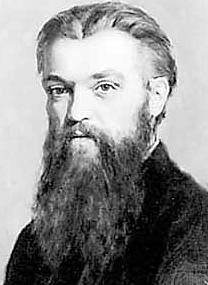Clifford, William Kingdon (1845–1879)

William Clifford was an English mathematician and philosopher who studied non-Euclidean geometry and topology. In 1870, he wrote On the Space-Theory of Matter in which he argued that energy and matter are simply different types of curvature of space – a remarkably advanced idea that would come to fruition in Einstein's general theory of relativity. His theory about biquaternions generalized William Hamilton's theory of quaternions, linking them with more general associative algebras.
Clifford was born at Exeter and educated at a school in his native town, at King's College, London, and at Trinity College, Cambridge. While at Trinity he did not confine himself to examination subjects, but read widely in the great mathematical writers, and came out second wrangler in 1867. At this time, while excelling in gymnastics (although small of build he was remarkably strong and able to do one-armed chin-ups), he would also solve and propound problems in the pages of the Educational Times, and could discuss with ease complicated theorems of solid geometry without the aid of paper or diagram. In 1871 he was elected to the chair of Mathematics and Mechanics at University College, London, which post he retained until his untimely death as the result of overwork and exhaustion.
Clifford first established his reputation as an original thinker with the ability to express himself in plain and simple language at a Friday evening discourse at the Royal Institution, On Some of the Conditions of Mental Development. He was a valued member of the London Mathematical Society, contributing to the Proceedings; for a time he acted as secretary, and afterwards vice-president of the British Association; he also lectured to the Sunday Lecture Society on various physical and philosophical subjects.


